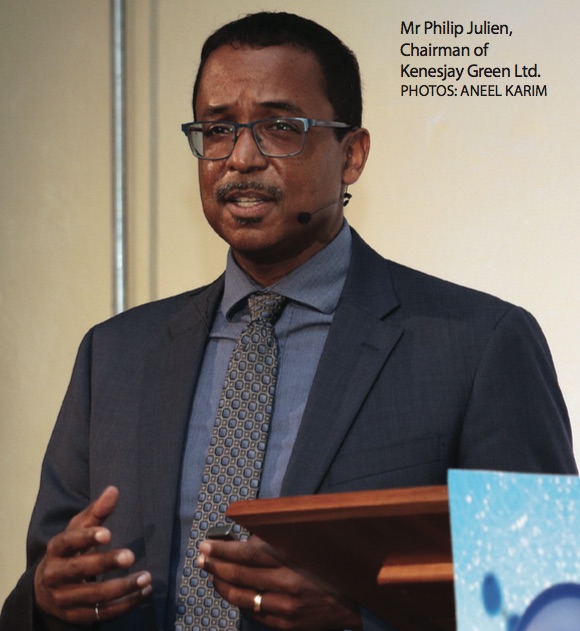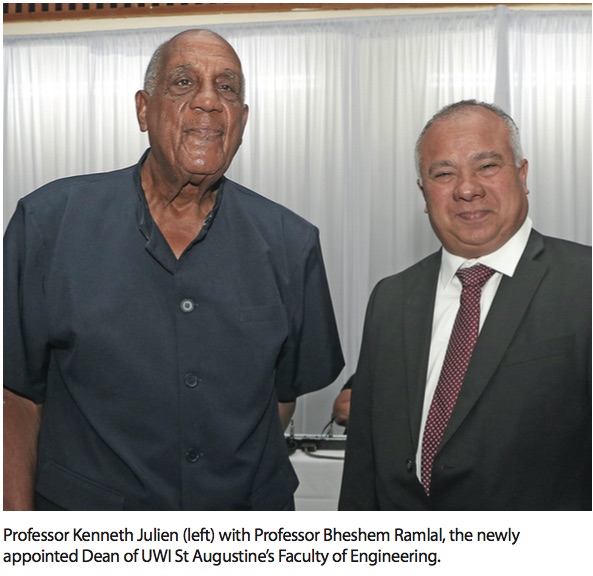
As students, academics, and private sector representatives settled themselves in the lecture theatre for the Faculty of Engineering’s inaugural Hydrogen Symposium, they, quite unexpectedly, were called on to be warriors during the day’s presentations. This was the message that Philip Julien, Chairman, Kenesjay Green Ltd put to the assembled audience during his remarks.
Urging them to be “hydrogen warriors”, he said, “we are looking for people to join us in this journey as we defy the odds and create possibilities out of the impossible.”
Julien explained that the symposium, held on September 21 at the St Augustine campus, was the hub where academia and the private sector would conceptualise solutions to combatting the looming effects of climate change.

He stressed that the world was facing a climate crisis: “Those of us in the industry who know the numbers are alarmed.” He explained that his company came to UWI and UTT aiming to bring “the best of academia to bear against the toughest challenges that our energy sector faces in creating a sustainable energy future”.
The symposium highlighted how hydrogen could be the sustainable answer to replacing fossil fuels. During his address, Professor Prakash Persad, President of the University of Trinidad and Tobago, noted that hydrogen is already well established in industry, but there is potential for it in many other areas.
Green, blue and grey hydrogen can be found in Trinidad and Tobago. Prof Persad emphasised the importance of having a multi-disciplinary team to research the topic, and noted that he was pleased to see UTT and UWI collaborating.
The focus on renewable energy is particularly timely as small island states are particularly vulnerable to the impacts of the changing climate. During his keynote address, Dr Devon Gardner, Head of Technical Programmes at the Caribbean Centre for Renewable Energy and Energy Efficiency noted that Caribbean economies are very climate sensitive. He outlined the areas that would be affected by unchecked climate change including agriculture, fisheries, and tourism
According to Julien, many believe “there is no future, that we are slowly dimming the lights on humanity’s future”. He went on, “many of us in this room are here to say we are taking a stand. We will not go quietly into the night. We will stay, and we will fight, and that fight is for the future, a sustainable future through sensible energy utilisation”.
Hydrogen, he explained, is a clean, alternative fuel.
The day’s presentations touched on the various ways hydrogen can be implemented to reduce dependence on fossil fuels in areas like the steel industry, the chemical industry, refineries, shipping, transportation, heating and power generation.
“All of these things that we currently depend on from a fossil fuel base can theoretically be substituted, replenished, and enhanced with a fossil-free source of energy called hydrogen,” Julien said.
The symposium spotlighted the growing importance of green hydrogen, which is created by sending a stream of electricity through water. The result is hydrogen and oxygen. Many of the discussions centred on using renewable energy to drive the process.
During his presentation, Dr Gardner illustrated how renewable resources in several Eastern Caribbean islands could provide the needed fossil-free resources. He emphasised the potential of off-shore wind, and mentioned plans to have two flagship projects to this end in Antigua and Barbuda, and Saint Kitts and Nevis. He noted that, with the proper incentives, several islands in the region also have the potential to provide another fossil-free resource: geothermal energy.
Dr Gardner said the main goal is to transform the economies of these countries. “We will be able to diversify to less climate dependent economies, and that is where the future of the Caribbean lies.”

The symposium also took the time to honour Professor Kenneth Julien, father of Philip Julien, and one of the original leaders and “hydrogen warriors” of the local energy sector. Prof Julien, UWI St Augustine’s first T&T-born engineering lecturer with a PhD, was in the audience as they announced the implementation of the Professor Kenneth S Julien Endowment Fund.
The conference presenters illuminated the legacy of Prof Julien and his contemporaries in the sector, as well as the importance of the Caribbean region taking proactive steps to reduce dependence on fossil fuels and of adopting renewable energy sources instead of waiting for others to solve the problem.
“Nobody is coming to save us. We have to save ourselves as a species, as humanity, as a people,” said Philip Julien.
“One of you might not only change the world,” he told the audience members. “You might just save it too.”
Students from Presentation College Chaguanas were also recognised for an electrolysis process they created to produce hydrogen as part of a global robotics challenge.
In his welcome address, Professor Bheshem Ramlal, UWI St Augustine’s newly appointed Dean of the Faculty of Engineering, shared the predominant sentiment of the day, both for the greater adoption of hydrogen as an energy source and for the existential threat of climate change.
“We need to think about what we can do to address the challenges before us.”